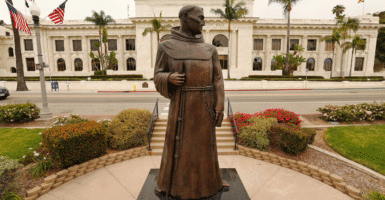California schools are obsessed with race.
One school district in the Bay Area has enforced mandatory, critical race theory-based “ethnic studies” lessons beginning in preschool. In another district, a San Diego high school principal and school board skirted the law in their rush to erase California history and the legacy of a Catholic saint after whom the high school was named, deeming St. Junipero Serra to be a colonialist with a racist past.
Like much of the current educational preoccupation with race, the renaming efforts stemmed largely from the 2020 Black Lives Matter protests and related demonstrations, as well as the increasing popularity of purported curative antiracist efforts of critical race theory.
What began simply as a student-led effort in 2020 to change the school’s mascot from the Conquistadors to the Rattlers prompted Erica Renfree, Junipero Serra High School principal, to use a series of underhanded attacks to change the school’s name to Canyon Hills High School/Mat Kwatup KunKun.
Renfree justified her move by referencing the criminal destruction of statues of Father Junipero Serra, a Catholic saint known as the Apostle of California, during the 2020 protests. She seemed to believe the wind was at her back, using the statues’ destruction as the public relations platform for efforts to divest the high school of its namesake.
But as is the case with the modern, perpetually aggrieved left, Renfree failed to consider alternative perspectives and do her homework. Instead, she jumped at the chance to score points with the woke overlords that permit no studied analysis of history.
If she had, Renfree might have learned that Serra, a Spanish missionary, exercised his influence and sense of moral duty to heroically protect the indigenous people from exploitation by Spanish conquerors. While Renfree had painted him as a bigoted racist, Serra was, in reality, anything but.
On July 14, 2021, the Thomas More Society filed suit in California Superior Court against Renfree and the San Diego Unified School District Board of Trustees on behalf of a group of the school’s alumni families and taxpaying residents of the surrounding community.
The Thomas More Society is alleging violations of Article I, Section 4 and Section 7 of the California Constitution, violations of the First and 14th Amendments (the establishment clause and the due process clause) of the federal Constitution, and a violation of the California Brown Act, which is intended to provide the public access to meetings of California’s local government agencies.
Among the violations of the Brown Act, the plaintiffs allege that adequate notice was not provided to the public that a vote on renaming the school would take place. The San Diego Unified School District board of trustees had published a misleading internal agenda item for its March 9 meeting that gave no indication whatsoever that the board was going to make a final decision to rename the high school via single vote.
Instead, the agenda indicated that the board would only issue a recommendation to the school to change its name. The board did not notify the public that the meeting itself would occur, let alone that the public comment would be welcomed.
The plaintiffs are part of a group known as Preserve Serra High, a coalition formed to object the school district’s unlawful renaming of a publicly funded high school without input from local resident taxpayers. Their lawsuit seeks declaratory and injunctive relief, requesting that the court halt the name change until the defendants provide all stakeholders equal opportunity for notice and hearing.
How did one principal exercise such singular outsized influence over the change of the high school’s name? She fomented anti-Catholic bigotry and claims of racism among her students, misrepresented the level of support for the name change, and convinced the school board to change its policy on renaming schools.
During a pandemic, and without the sufficient notice and comment period required by the Brown Act, the San Diego Unified School District board changed a rule—“facility names are permanent”—that had been continuously in force since 1964.
In its place, the San Diego Unified School District board adopted a new policy in January 2021 permitting the establishment of committees to rename facilities subject to community participation.
Unsurprisingly, the high school’s name change was hastily approved through an ad hoc “naming committee” so as to secure a spot for the renaming resolution on the San Diego Unified School District board of trustee’s February agenda.
Renfree worked with religiously hostile organizations to mount her campaign, including the city of San Diego’s Human Relations Commission.
In its letter of support for the name change, this group said, “[I]t is time to change school names and mascots that memorialize religious and confederate leaders or sympathizers and all whose names supported and stained our history.”
Paul Jonna, special counsel to the Thomas More Society, stated:
The Board of Education’s ‘vote’ on this name change was rigged—and based on false and misleading statements as well as manipulated data. The government officials conveniently changed the renaming rules in the middle of the pandemic, in order to effectuate their agenda, and left the entire community of Tierrasanta out of the process. The conduct at issue here violates both the Due Process and Establishment Clauses of the California and U.S. Constitutions.
As parents and stakeholders grapple with the onslaught of politically correct policies—including gender-neutral bathrooms, comprehensive sexuality education, and the divisive rhetoric of critical race theory—the battle for American schools at the local level has intensified. Based on the efforts of education leaders like those in California, it shows no signs of slowing in the fall.
Have an opinion about this article? To sound off, please email [email protected] and we’ll consider publishing your edited remarks in our regular “We Hear You” feature. Remember to include the URL or headline of the article plus your name and town and/or state.






























